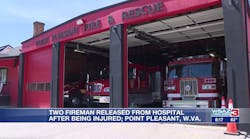I’m sure I’m not the first person to ask Captain Robert Webber that question and I am certain I won’t be the last. But I was curious as to why a 22-year veteran of the Atlanta Fire Department would leave his job and family to go to a war-torn Middle Eastern country. Even though it was evident that he had answered the “why” question many times, it was just as obvious that Webber spoke from the heart.
“I am a patriot and we are at war,” he said. “I’ve never served in the military. I’ve never served my country in that way and I always regretted never having done that. And now, lo and behold, at 50 years old I’ve got an opportunity to serve my country and I get to do it in a way that I know best and that is the fire service.” Webber left for Iraq on Memorial Day.
The possibility of serving overseas began when Webber responded to an e-mail requesting individuals to help restructure fire and emergency medical services in Iraq.
“It’s bigger than me,” Webber explained. “When you are at war like that it’s not just Bush’s problem or the military’s problem, I mean there are all kinds of ways different companies, organizations and people can help the effort.”
Although the military is capable of providing fire suppression and EMS, private contractors supply the majority of the work. One such company, Kellogg, Brown and Root, has been actively recruiting emergency response personnel. The prospect of earning a substantial tax-free income has proven to be a strong incentive, as many of the positions pay six-figure salaries.
To be considered for employment, though, applicants are required to complete a stringent background check and a fitness-for-duty evaluation. Candidates must undergo extensive physical and medical examinations, including prostate screening, HIV testing, chest X-rays and related blood work. Once an individual is hired, he or she then receives a series of vaccinations for hepatitis A and B, typhoid, yellow fever and polio.
Due to the increased risk of contracting malaria, all personnel must begin taking preventive medication prior to departing for Iraq and continue taking it for their entire tours of duty. For most employees, a prescription equal to a one-year supply of medicine is required. Even after returning to the United States, it is necessary to continue the medication for a full seven days.
“There have been cases,” Webber elaborated, “where people did not finish the medicine after coming back and came down with malaria.”
Along with the many health risks associated with working in Iraq, physical dangers come with the territory. Soldiers, contractors and civilians have all been targets of enemy fire. In addition, militant forces have conducted numerous abductions and have even taken hostages, with some resulting in fatal outcomes. When asked about the possible perils of working in Iraq, Webber was confident.
“I am a man of faith,” he said. “I really do believe that this is God’s direction for me. I know that He is in control. I know many times on this job that I could have been hurt or killed and I wasn’t. It wasn’t because of any of my skills or anything that I did particularly. It just wasn’t my time. I’m a firm believer in that. This is a dangerous job and that’s a dangerous job.”
Although Webber is stationed on one of the 13 military bases, there is still a degree of travel involved between assignments. With the frequent occurrence of roadside bombings and attacks involving rocket-propelled grenades, it is definitely not the safest commute.
“I have a healthy fear for dangerous situations,” Webber said. “I think we have to. It’s all about being an effective leader. I have to have a healthy fear so that I can make sound decisions to keep myself and others safe in bad situations.”
Webber’s position in Iraq is that of assistant fire chief. As second in command, he is in charge of managing the base during the fire chief’s absence.
When asked what his main objective in Iraq is, Webber replied, “To do as much good as I can, just do my part. Just to be able to serve there and effectively provide fire and EMS for the military bases, just like we do here. To make sure that lives and property are saved.”
Although he was not sure of the entire scope of his responsibilities, Webber is certain that part of the job will involve helping his Iraqi fire department become self-sufficient. As far as a schedule is concerned, Webber is on notice to be prepared to work sun up to sun down. Basically, this translates into 12- to 14-hour shifts, seven days a week.
While working overseas provides a financial benefit, it also means being away from the family. To meet the guidelines for a tax-free income, Webber must stay off U.S. soil for at least 300 days during his 12-month tour. In an effort to accomplish the monetary goal and still be able to spend time together, the Webbers are planning a family vacation in Amsterdam. Webber will be eligible for a 10-day vacation after his first 120 days in Iraq. He will receive an additional 10-day leave at 240 days and then again at 360 days.
Although they are going to miss him, Webber’s family has been very supportive of his decision.
“Both of my daughters have been on mission trips to Panama and Ecuador,” he said. “They know what it is like to go and serve and help others.”
In addition to being away from his wife and daughters, Webber had to leave the crew at Atlanta Fire Station 7.
“We’ve got a really tight bunch here,” he said before leaving for Iraq. “We really have a good crew. The guys like the job, they do their job and they get along … We really enjoy coming to work every third day here. I know they are going to miss me and I’m going to miss them too. It’s going to be hard to leave them, and of course they are a little concerned who they might get as a captain.”
Bill May is a captain and 21-year veteran of Atlanta Fire-Rescue. He has served on the department as an instructor at the training academy and as an officer in the field. May is currently assigned to the Fire Chief’s Office in charge of special projects.





